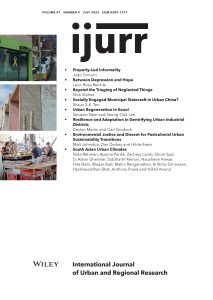n this article, which is based on an empirical analysis of neoliberal restructuring in Leipzig, East Germany, I describe how the study of affective atmospheres adds to our understanding of urban restructuring, showing how collective moods affect (de)mobilization, contestation and the regulation of urban political economy to shed light on the relation between institutional, political and social processes. I demonstrate the relevance of affect for power relations, political interactions beyond rationality, and the rhythms and temporalities of urban restructuring, as exemplified by two prominent atmospheres that characterize Leipzig—post shrinkage depression (PSD) and anticipatory hope (AH).

